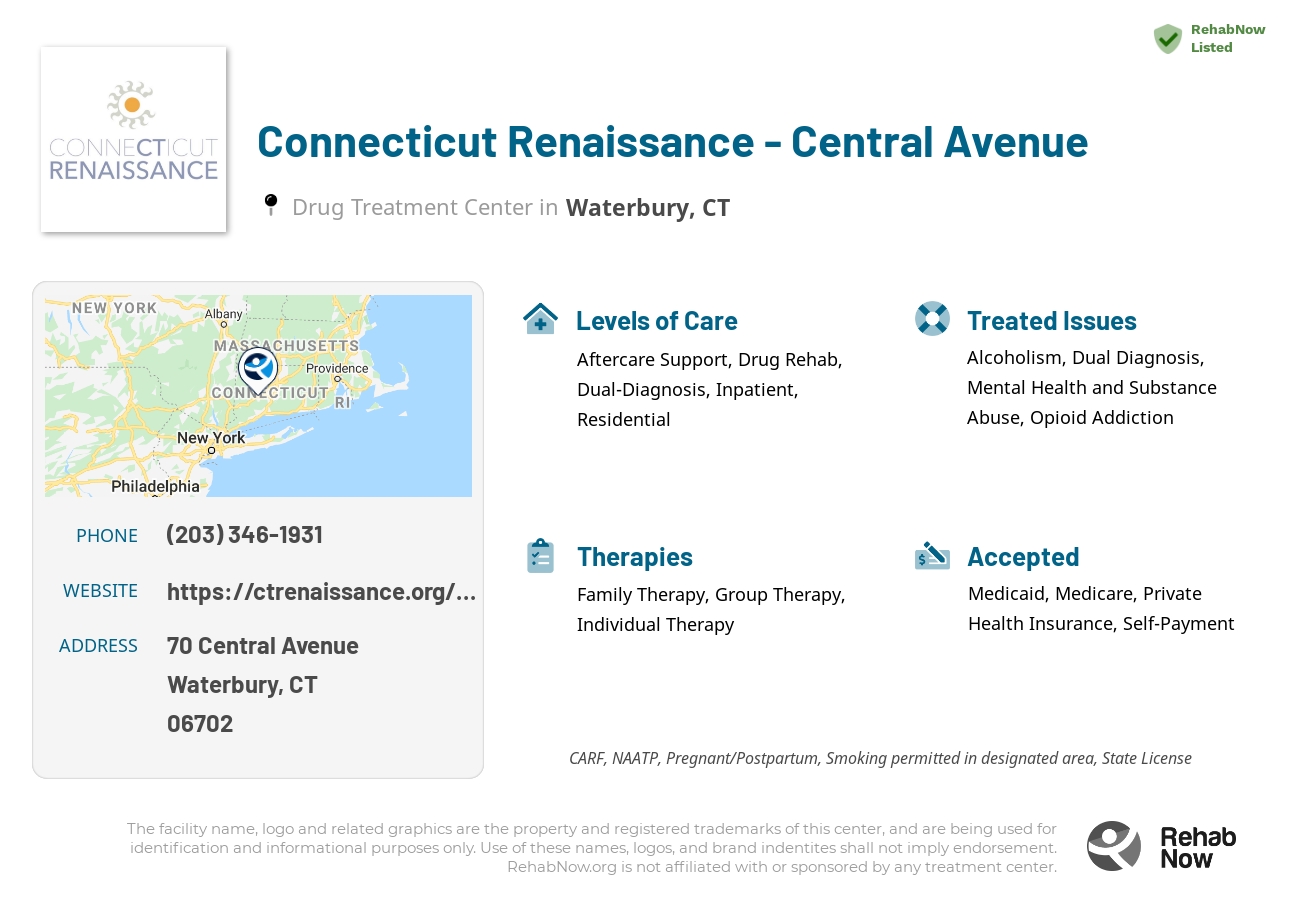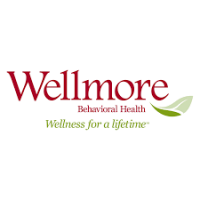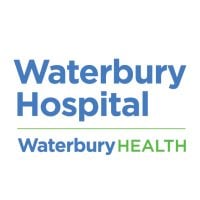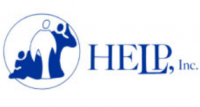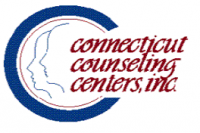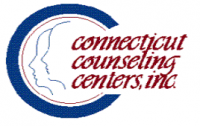Connecticut Renaissance - Central Avenue
Drug Rehab Center in Waterbury, Connecticut
Connecticut Renaissance - Central Avenue in Waterbury, Connecticut is a treatment facility for substance abuse and addiction, offering comprehensive care, evidence-based therapy models, specialized programs, family support services, and high-quality care.
About Connecticut Renaissance - Central Avenue in Connecticut
Connecticut Renaissance - Central Avenue, located in Waterbury, Connecticut, focuses on outpatient treatment for individuals grappling with mental health diagnoses and/or substance addiction. This facility stands out for its commitment to empowering clients through evidence-based practices in a respectful, dignified, and passionate environment. Their approach integrates scientific research with best practices to ensure the most effective treatment.
- Evidence-Based Therapies: Utilizes scientifically validated therapies to ensure the highest quality of care for clients.
- Comprehensive Care: Offers a broad spectrum of services, including psycho-educational groups, stress and anger management, and relapse prevention.
- Accredited Quality: Proudly accredited by CARF, highlighting its dedication to maintaining high standards in behavioral health services.
Connecticut Renaissance - Central Avenue is CARF-accredited, underscoring its excellence in behavioral health services. The facility provides a nurturing environment where clients are empowered to make positive changes, emphasizing respect, dignity, and passion in their recovery journey.
The center treats a variety of addictions and mental health issues, offering a range of care levels from outpatient services to more intensive programs. Treatment methods include Cognitive Behavioral Therapy (CBT), Dialectical Behavioral Therapy (DBT), and Motivational Interviewing (MI), catering to the unique needs of each individual.
Genders
Ages
Modality
Additional
Accreditations

CARF
The Commission on Accreditation of Rehabilitation Facilities (CARF) is a non-profit organization that specifically accredits rehab organizations. Founded in 1966, CARF's, mission is to help service providers like rehab facilities maintain high standards of care.
Conditions and Issues Treated
With so many people addicted to opioids, we need to help those who want to quit. The cycle begins when opioid addicts take opioids for a painful injury. When someone starts taking their medication differently or in excess, it means they’re addicted and at risk of overdosing.
In , detoxing from these types of treatments is the most effective way to beat this. Most facilities begin with medical assistance and then provide counseling services; rehabilitation follows after successful treatment.
Dual diagnosis refers to someone who has both an addiction and a mental or emotional illness. Dual diagnosis treatment includes therapy for both issues simultaneously, allowing for effective treatment of either.
Sometimes people with addiction disorders also have co-occurring disorders like depression, anxiety, bipolar disorder, etc. These require specialized treatment programs that address both drug and alcohol addiction as well as psychiatric illnesses. Some rehabilitation facilities provide patients with co-occurring disorders a program with highly integrated services and a clean, distraction-free environment.
Levels of Care Offered
This center offers a variety of custom treatment tailored to individual recovery. Currently available are Aftercare Support, Drug Rehab, Dual-Diagnosis, Inpatient, Residential, with additional therapies available as listed below.
Inpatient treatment is a form of recovery used in drug rehab. Inpatient recovery offers individual therapy, groups, and family therapy to ensure that the addict has the best recovery possible. A variety of treatments are provided in this type of recovery, depending on what treatment the addict needs at that particular time.
The length of inpatient addiction treatment depends on the addict and their addiction. Inpatient rehabilitation can last anywhere from 30 days to 90 days, depending on how severe the drug abuse is. Inpatient rehab is a costly drug treatment, costing anywhere from $30k- to $60k. However, insurance often offers help in covering these costs.
Residential treatment programs are those that offer housing and meals in addition to substance abuse treatment. Rehab facilities that offer residential treatment allow patients to focus solely on recovery, in an environment totally separate from their lives. Some rehab centers specialize in short-term residential treatment (a few days to a week or two), while others solely provide treatment on a long-term basis (several weeks to months). Some offer both, and tailor treatment to the patient’s individual requirements.
The accomplishment of completing a drug or alcohol treatment program is just the first step. Once that is complete, aftercare support comes into play. This includes helping people adjust to life without substances outside of guidelines with assistance like getting sober living accommodations and career counseling and AA/NA programs for those who are struggling between sobriety or want continued help in maintaining it once they have completed their initial rehabilitation at an addiction facility.
Aftercare comprises services that help recovering addicts readjust to normal day-to-day activities while working on specific issues. These problems include psychiatric issues, family problems caused by substance abuse, continuing education pursuits if desired during rehab, etc. These can last up to one year+ depending on what’s needed most urgently upon completion of earlier stages.
Therapies & Programs
Different people react differently to various treatment options. Some drug rehabilitation centers offer individualized treatment that caters to the specific needs of a drug addict. The best treatment option varies on an individual depending on the type of drug abused, life history, medical condition of the person, social circumstances, and the environment they live in now.
When a person enters drug rehab, they usually have anti-drug associations such as withdrawal symptoms, stress, cravings, etc. The first step of drug rehab is to detoxify the body from any residual substances in it. Drug rehabilitation centers usually employ trained medical professionals to help in this process. Usually, the initial detoxification lasts for five days, where the person is monitored under close supervision.
Family therapy sessions typically involve the addict and their family members. During these sessions, a therapist will work with everyone involved to help them understand addiction and find healthy ways of coping without substance abuse.
Some addicts might feel embarrassed about their substance abuse problems. By encouraging family members to attend these sessions, therapists can show addicts that they’re not alone in dealing with addiction. Therapists can also work with family members to help them understand addiction and learn how to offer support and encouragement to their loved one as they deal with substance abuse issues.
Attending group therapy at Connecticut Renaissance - Central Avenue in , is a useful way for those seeking sobriety to realize they aren’t the only one going through it.
This is when a group of people on different recovery phases get together and talk about what they’re going through, their triggers, successes, and failures. This can include alternative types of therapies too! Group therapy may occur on an outpatient or inpatient basis with groups that have no pre-existing relationships outside the session, unlike support groups where everyone already knows each other beforehand.
Payment Options Accepted
For specific insurance or payment methods please contact us.
Is your insurance accepted?
Ask an expert, call (888) 674-0062
Connecticut Renaissance Associated Centers
Discover treatment facilities under the same provider.
- Connecticut Renaissance - Waterbury West Treatment Program in Waterbury, CT
- CT Renaissance in Stamford, CT
- Connecticut Renaissance - Main Street in Bridgeport, CT
- Connecticut Renaissance - Wolcott street in Waterbury, CT
- Connecticut Renaissance - Outpatient Behavioral Health Clinic in Norwalk, CT
Learn More About Connecticut Renaissance Centers
Additional Details
Specifics, location, and helpful extra information.
Waterbury, Connecticut 6702 Phone Number(203) 346-1931 Meta DetailsUpdated April 15, 2024
Staff Verified
Connecticut Renaissance - Central Avenue Patient Reviews
There are no reviews yet. Be the first one to write one.
Waterbury, Connecticut Addiction Information
Connecticut has a higher rate of substance abuse and addiction than the national average. The state ranks in the top 10 in the country for illicit drug dependence among those ages 18 to 25. In 2010, there were 9,211 people admitted to an alcohol treatment facility for alcohol abuse combined with a secondary drug. Connecticut ranked fifth in the United States of America for the number of fatalities involving drunk driving in 2014.
Waterbury, CT is a community that has been deeply affected by drug addiction and abuse. In 2019, there were 1,496 reported cases of drug abuse and addiction. In Waterbury, there were 112 overdose deaths in 2016, which is a rate of 24.8 deaths per 100,000 people. The most commonly abused drugs in Waterbury are heroin and cocaine. The city has established several initiatives to help residents get treatment services.
Treatment in Nearby Cities
- Farmington, CT (17.7 mi.)
- Guilford, CT (26.7 mi.)
- Westport, CT (33.2 mi.)
- Rocky Hill, CT (20.7 mi.)
- Bethlehem, CT (10.1 mi.)
Centers near Connecticut Renaissance - Central Avenue
The facility name, logo and brand are the property and registered trademarks of Connecticut Renaissance - Central Avenue, and are being used for identification and informational purposes only. Use of these names, logos and brands shall not imply endorsement. RehabNow.org is not affiliated with or sponsored by Connecticut Renaissance - Central Avenue.



